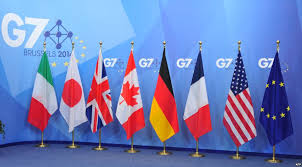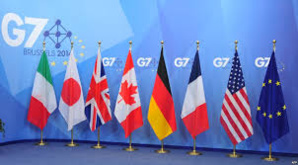While Europe and Japan have showed that they remained worried about Washington's shift in trade and economic policies, the United States said on Saturday that the world's other rich economies were getting used to the policy plans of President Donald Trump.
In the hope of hear more about Trump's plans which they fear will set back the global approach to issues such as banking reform and climate change and will revive protectionism, officials from the Group of Seven nations met in southern Italy.
The United States reserved the right to be protectionist if it thought trade was not free or fair, said U.S. Treasury Secretary Steven Mnuchin.
"We do not want to be protectionist but we reserve our right to be protectionist to the extent that we believe trade is not free and fair... Our approach is for more balanced trade, and people have heard that," Mnuchin told reporters at the end of the two-day meeting.
"And as I say, people are more comfortable today, now that they've had the opportunity to spend time with me and listen to the president and hear our economic message."
The fact that they did not share his view was made clear by other ministers from the G7 countries.
"All the six others ... said explicitly, and sometimes very directly, to the representatives of the U.S. administration that it is absolutely necessary to continue with the same spirit of international cooperation," French Finance Minister Michel Sapin told reporters.
After years of sluggish growth following the financial crisis that began nearly a decade ago, there was a "light breeze" of optimism within the G7 about the recovering global economy, said Bank of France Governor Francois Villeroy de Galhau.
While echoing comments made on Friday by Japanese Finance Minister Taro Aso, Villeroy de Galhau said the continued uncertainty about the direction of U.S. policy represented a risk.
"We must not backpedal on free trade as it has contributed to economic prosperity," Aso said.
The only way to establish fairness was by sticking to the rules of the World Trade Organization - a multilateral framework and no-one knows what the United States understands by "fair trade", European G7 officials complain.
And since trade deficits and surpluses could only be analyzed in a global context, they also say the U.S. demand to balance trade bilaterally was not economically sound.
While the biggest question mark was over possible U.S. tax cuts that could fire up an already recovering U.S. economy, uncertainties remained over how quickly the U.S. Federal Reserve would raise interest rates, a senior Japanese finance ministry official said on Saturday.
Trump has offered multinational businesses a steep tax break on overseas profits brought back home and has proposed slashing the U.S. corporate income tax rate.
A "border-adjustment" tax on imports as a way to offset revenue losses resulting from tax cuts, was however dropped by him.
Some European officials also questioned the tax reform plans. "I am not so sure that with an economy already at full employment and working at full speed a fiscal stimulus would add a lot," European Commissioner for Economic and Financial Affairs Pierre Moscovici told reporters.
"(But) we avoided some discussions which would have been more damaging, like the border adjustment tax, which is no longer on the table at this moment," he said.
(Source:www.reuters.com)
In the hope of hear more about Trump's plans which they fear will set back the global approach to issues such as banking reform and climate change and will revive protectionism, officials from the Group of Seven nations met in southern Italy.
The United States reserved the right to be protectionist if it thought trade was not free or fair, said U.S. Treasury Secretary Steven Mnuchin.
"We do not want to be protectionist but we reserve our right to be protectionist to the extent that we believe trade is not free and fair... Our approach is for more balanced trade, and people have heard that," Mnuchin told reporters at the end of the two-day meeting.
"And as I say, people are more comfortable today, now that they've had the opportunity to spend time with me and listen to the president and hear our economic message."
The fact that they did not share his view was made clear by other ministers from the G7 countries.
"All the six others ... said explicitly, and sometimes very directly, to the representatives of the U.S. administration that it is absolutely necessary to continue with the same spirit of international cooperation," French Finance Minister Michel Sapin told reporters.
After years of sluggish growth following the financial crisis that began nearly a decade ago, there was a "light breeze" of optimism within the G7 about the recovering global economy, said Bank of France Governor Francois Villeroy de Galhau.
While echoing comments made on Friday by Japanese Finance Minister Taro Aso, Villeroy de Galhau said the continued uncertainty about the direction of U.S. policy represented a risk.
"We must not backpedal on free trade as it has contributed to economic prosperity," Aso said.
The only way to establish fairness was by sticking to the rules of the World Trade Organization - a multilateral framework and no-one knows what the United States understands by "fair trade", European G7 officials complain.
And since trade deficits and surpluses could only be analyzed in a global context, they also say the U.S. demand to balance trade bilaterally was not economically sound.
While the biggest question mark was over possible U.S. tax cuts that could fire up an already recovering U.S. economy, uncertainties remained over how quickly the U.S. Federal Reserve would raise interest rates, a senior Japanese finance ministry official said on Saturday.
Trump has offered multinational businesses a steep tax break on overseas profits brought back home and has proposed slashing the U.S. corporate income tax rate.
A "border-adjustment" tax on imports as a way to offset revenue losses resulting from tax cuts, was however dropped by him.
Some European officials also questioned the tax reform plans. "I am not so sure that with an economy already at full employment and working at full speed a fiscal stimulus would add a lot," European Commissioner for Economic and Financial Affairs Pierre Moscovici told reporters.
"(But) we avoided some discussions which would have been more damaging, like the border adjustment tax, which is no longer on the table at this moment," he said.
(Source:www.reuters.com)






